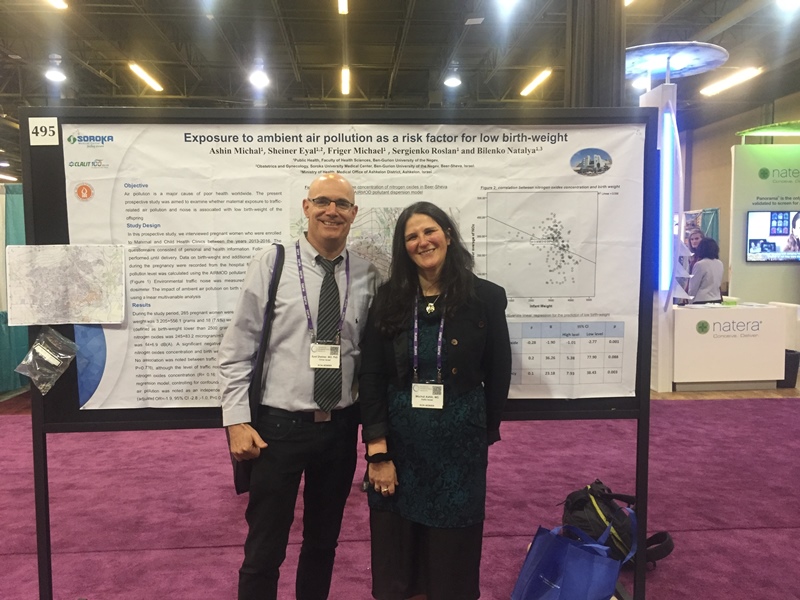A new prospective study being conducted now at Soroka University Medical Center in collaboration with BGU's Department of Public Health points to a direct correlation between traffic noise and ambient air pollution and the health of pregnant women and birth outcomes. In particular, noise and air pollution have raised the incidences of pre-eclampsia, gestational diabetes and low birth weights.
The study was presented recently at the 38th Annual Pregnancy Meeting of the Society for Maternal-Fetal Medicine that took place in Dallas, Texas, USA.
The team of researchers from Soroka University Medical Center and BGU included Prof. Eyal Sheiner, Director of Obstetrics and Gynecology B, and Prof. Natalya Bilenko, Prof. Michael Friger and Dr. Michal Ashin from BGU's Department of Public Health. They investigated the relationship between traffic noise and air pollution in the vicinity of pregnant women living in Beer-Sheva and their health during pregnancy and childbirth.
The study recruited several hundred pregnant women living in Beer-Sheva. They were interviewed using a comprehensive questionnaire. The interviews were conducted in "Tipat Chalav" clinics throughout the city and the Ob/Gyn ER at Soroka. During the interviews, the women were asked about their medical history, lifestyles and socio-demographic data. In the second part of the interview, the women were asked about noise in the area close to their homes and asked to describe the area where they live. In addition, they were asked about the level of sensitivity (exposure) to traffic noise while at home. The noise exposure level was measured in the questionnaire on a scale between 0-10 (0 - insensitivity to noise to 10 - very sensitive to noise). In addition, noise levels were measured near the homes of the participants using a portable noise meter and the highest concentrations of traffic air pollutants such as nitrogen oxides (NOx) were also measured in the Beer-Sheva area. Data on the course of their pregnancies and birth outcomes were recorded from records at Soroka.
The results indicated that the level of sensitivity to traffic-related noise reported was independently connected to pre-eclampsia even after the standardization of factors such as obesity before pregnancy, age, fetus sex, chronic illness and the number of previous births. Examining the impact of combined exposure to traffic noise and air pollution shows that it raises the risk of developing pre-eclampsia at least five times when the confounding factors are neutralized.
In addition, the reported level of sensitivity to traffic noise was found to be connected to gestational diabetes, even after adjusting confounding factors such as age and obesity.
Another finding was the correlation between air pollution in a residential environment, which was found to negatively affect a baby's weight at birth.
"We were always taught that a man is affected by his surroundings," says Prof. Sheiner. "The research shows that traffic noise and air pollution are connected to especially worrying poor pregnancy outcomes in an industrialized environment such as our own."
Dr. Michal Ashin added: "Reducing environmental exposures such as transport noise and air pollution is achievable and could lead to a reduction in unwanted birth outcomes and may affect the health of pregnant women for the better."
